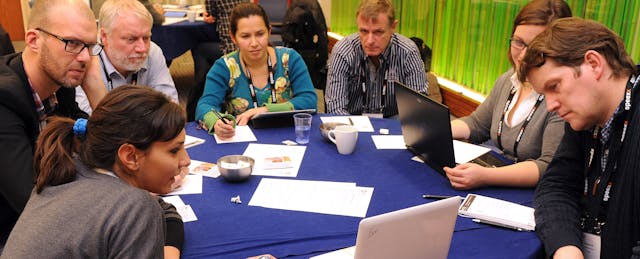As thought-leaders in the tech education space, CareerFoundry was excited to be invited to take part in Educa Online Berlin, a conference where educators, administrators and academics at the forefront of reforms in edtech and education discussed the current move towards an “Education Reality Check,” essentially how institutions are recognizing the role technology is playing in transforming the model of modern learning.
Attended by over 2,000 edtech specialists from over 100 countries, this year’s Online Educa Berlin conference focused on the evolving shape of modern learning and the opportunities that the variety of modern, technology-supported learning brings to students worldwide.
We were privileged to be asked to be a part of the “Higher Ed or Higher Tech” panel, where we discussed how to use technology to teach our brightest and best talent, focusing on the role of curriculum designers, mentor-led communities and faculty in the online adoption, quality and control process.
Self-directed learning
Dan Peters, from Blackboard B.V. in the Netherlands, kicked off the discussions with his talk “The Selfie and the Shift from Students as Consumers to Students as Creators.” Peters discussed how the needs of the learner have changed based on the availability of technology. Rather than simply passively absorbing information, learners want to be the creators and producers of their own education, which makes for a more satisfying and effective learning method. Peters used the relatively recent popularity of selfies as evidence that people feel empowered by this idea of taking control, becoming their own celebrity and sharing their image with the world online. This is a change we have seen from young people who want to produce their own content, rather than simply consume what is already there.
A common topic of discussion throughout the day was that in many spheres, trends are moving towards self-directed learning, with technology enabling students to learn at their own pace within an individualized environment rather than simply passively consuming. Irrespective of this online evolution of users taking control over their own learning, teaching methods remain the same. In traditional classrooms, knowledge is "passed" from the teacher to the student. Using technology to teach in the style of the old methods isn’t making the most of what it can do for our students. Technology should not just be a substitute. Rather, it should be embraced as a new way of learning that is inclusive, collaborative, individualized and active rather than passive. Technology is able to transform the learning process to be student-centered, rather than instructor controlled.
Personal > Personalized
Creator of one of the first early MOOCs, Stephen Downes, and his talk, “Reclaiming Personal Learning,” added another interesting element to the edtech debate. He emphasized the value of Personal Learning over Personalized Learning, with the former defined as “learning for yourself” with the latter as “taking a few variables and changing them.” Technology, and in particular the internet, has allowed for individual personal spaces, and with the rise of MOOCs, a network of connected resources has been created which enables students to genuinely own their own learning. An emphasis needs to be placed on education, not its commodification or commercialization.
Student-centered learning
Ultimately there is no one model for contemporary learning, but online learning that is self-directed and student-centered offers a plethora of options to students and educators. This point was highlighted by Inge de Waard of the Open University UK. While some students enjoy collaboration with others, many enjoy learning alone. Some are learning for professional reasons, others for personal development. There is not a “one size fits all” solution to education; each person’s learning curve is as individualized as the person themselves. Context is also crucial, for example, conceptual learning may be better facilitated by discussion, while application of skills depends on practice and getting feedback.
As we have seen with the high dropout rates of MOOCs, online learning isn’t always a perfect solution, but step by step it’s getting closer. Online educators, including us here at CareerFoundry, have learned (and continue to learn) from their mistakes to improve the experience for both students and educators alike, slowly realizing the benefits that technology can bring to the classroom. Online educational platforms now acknowledge that supporting facilitators need to have a clear role and defined expectations in order to provide guidance to teachers and students. Another big lesson has been the realization that community lies at the heart of learning for many people, and online platforms need to somehow accommodate this through small groups or forums, giving peers the opportunity to share experiences and offer feedback.
All together, the Online Educa Berlin conference showed that the education technology movement in Europe has a promising future ahead--not just for consumers, but also for producers and leaders of innovation in education.


